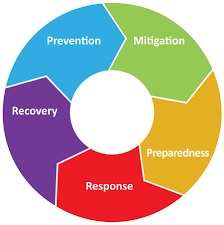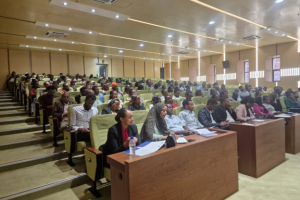
The Center of Excellence for Public Health Emergency Management (PHEM-CoE) at the Ethiopian Public Health Institute (EPHI) has recently launched a three-year program in Addis Ababa. The program aims to address public health emergencies, manage outbreaks of national and international concern, and develop robust public health emergency management systems that contribute to strengthening the overall national health system.
Speaking at the launching program, Health Minister Mekdes Daba (MD) highlighted the Ethiopian Public Health Institute’s significant activities in managing public health emergencies, preparedness, and response, collaborating with border checkpoints and states across the country.
Minister Mekdes (MD) expressed her appreciation to all stakeholders and partners for their initiations in establishing a center of excellence in public health emergency management in Ethiopia that plays vital role to respond to major health emergencies and deliver improved services not only within the country but also across Africa and globally, drawing on lessons learned from the time of COVID-19 pandemic and other public health crises.
She also urged all partners and stakeholders to work together efficiently and in coordination to ensure the success of the center’s establishment.
Health State Minister Dereje Duguma (MD), on his part, said that the designation of the Public Health Disaster Management Center as a Center of Excellence will enhance early warning, preparedness, response, and recovery systems at the national level. He also reaffirmed his Ministry’s commitment to providing the necessary support and follow-up to ensure the Center’s effectiveness.
In his message, EPHI Director General Mesay Hailu (MD) stated the Institute’s unreserved commitment in terms of effectively responding to health emergencies, especially in addressing complex overlapping outbreaks, by organizing and managing public health emergency coordination centers across the country. He also reaffirmed that the Institute, with organized human capital and integrated technology, will strive to meet the standards for this important milestone and realize its mission of becoming a Center of Excellence.
The Institute’s Deputy Director General and Coordinator of the Public Health Emergency Management Wing, Melkamu Abte (MD), on his part, explained the purpose of the Center. He said that the Center aims to strengthen public health emergency response capacity through targeted capacity-building activities supported by digital health information systems and the development of competent health professionals, thereby establishing a stronger and more effective center for delivering integrated public health emergency.
In related development, the World Health Organization (WHO) commended Ethiopia for its recent launch of the Public Health Emergency Management Center of Excellence (PHEM-CoE), recognizing it as a significant milestone in regional and global health leadership.
In an exclusive interview with ENA, Patrick Okumu Abok, WHO Team Leader for the Emergency Preparedness and Response Cluster in Ethiopia, highlighted that this initiative exemplifies Ethiopia’s expanding role as a center of excellence in public health emergency management across Africa. He emphasized that the establishment of the PHEM-CoE is not only a proud achievement for Ethiopia but also a major step forward for the continent, reflecting Ethiopia’s dedication and capacity to lead in responding to public health emergencies.
Abok pointed out that the Center’s creation demonstrates Ethiopia’s commitment to strengthening health security at national, regional, and international levels through a strong legal framework, effective policy facilitation, strategic planning, and the adoption of advanced information management systems and emerging technologies.
Abok also praised Ethiopia’s proven track record in managing infectious disease outbreaks, citing successful responses to cholera and measles, alongside its support to neighboring countries by deploying Emergency Medical Teams (EMTs), even as far as Turkey.
He noted that Ethiopia has set a pace in emergency preparedness and response across Africa, and WHO recognizes Ethiopia’s governance and leadership in this area. The organization considers itself privileged to collaborate with Ethiopia in achieving international standards of excellence in public health emergency management.
Furthermore, Abok highlighted Ethiopia’s proactive engagement in regional health strategies and cross-border cooperation efforts, which are critical for enhancing preparedness and disease prevention at regional levels.
WHO’s support for Ethiopia’s efforts has included technical assistance, strategic guidance, training, and capacity-building initiatives. Abok stated that WHO has embedded technical experts who work closely with the Ethiopian Public Health Institute (EPHI) and will continue this collaboration over the next three years.
The recently launched PHEM-CoE is expected to operate from 2025 to 2027, focusing on key areas essential for achieving recognition as a center of excellence. These areas include leadership and governance, innovation, digital transformation, and the securing of sustainable funding. WHO’s recognition and support underscore Ethiopia’s leadership in public health emergency management and its ongoing commitment to improving health security both regionally and globally.
Certainly, Ethiopia’s commitment to health-related issues, particularly in the areas of disaster preparedness and response, has become increasingly evident through strategic initiatives such as the recent launch of the Ethiopian Public Health Institute’s (EPHI) Center of Excellence for Public Health Disaster Management. This three-year program underscores the country’s recognition of the critical importance of strengthening health systems to effectively manage emergencies, especially in a region prone to various health crises including infectious disease outbreaks, natural disasters, and complex emergencies.
Ethiopia’s proactive approach highlights its dedication to building resilient health infrastructure capable of rapid response, early warning, and recovery, thereby safeguarding the well-being of its population. The government’s emphasis on establishing specialized centers and enhancing coordination among health agencies demonstrates a clear commitment to institutionalizing disaster preparedness as a core component of national health policy. Through such efforts, Ethiopia aims to establish a sustainable framework that not only addresses immediate threats but also enhances long-term resilience to future health emergencies.
The recent launching of the center’s three-year program is a significant milestone in Ethiopia’s broader health strategy, reflecting lessons learned from past crises such as the COVID-19 pandemic. The pandemic exposed vulnerabilities within the health system and underscored the necessity of organized, well-coordinated responses to complex health emergencies. In response, Ethiopia has prioritized capacity building, technological integration, and the development of comprehensive early warning systems as part of its disaster preparedness agenda.
The center’s activities—ranging from training healthcare workers to deploying digital health information systems—are designed to enhance the country’s ability to anticipate, respond to, and recover from health disasters swiftly and effectively. These efforts are aligned with Ethiopia’s overarching goal of achieving universal health coverage and ensuring that health services are resilient enough to withstand shocks.
Ethiopia’s commitment to health and disaster preparedness goes beyond its borders, positioning itself as a regional leader in strengthening health security across Africa. The country actively shares expertise, resources, and best practices with neighboring nations to enhance collective resilience against public health emergencies. This proactive approach underscores Ethiopia’s recognition of health as a fundamental human right and a vital component of sustainable development. Through investments in specialized institutions like the Center of Excellence for Public Health Disaster Management, Ethiopia reaffirms its dedication to safeguarding its population while contributing significantly to global health security efforts, fostering regional collaboration and resilience against future health threats.
BY LEULSEGED WORKU
THE ETHIOPIAN HERALD SATURDAY 17 MAY 2025




